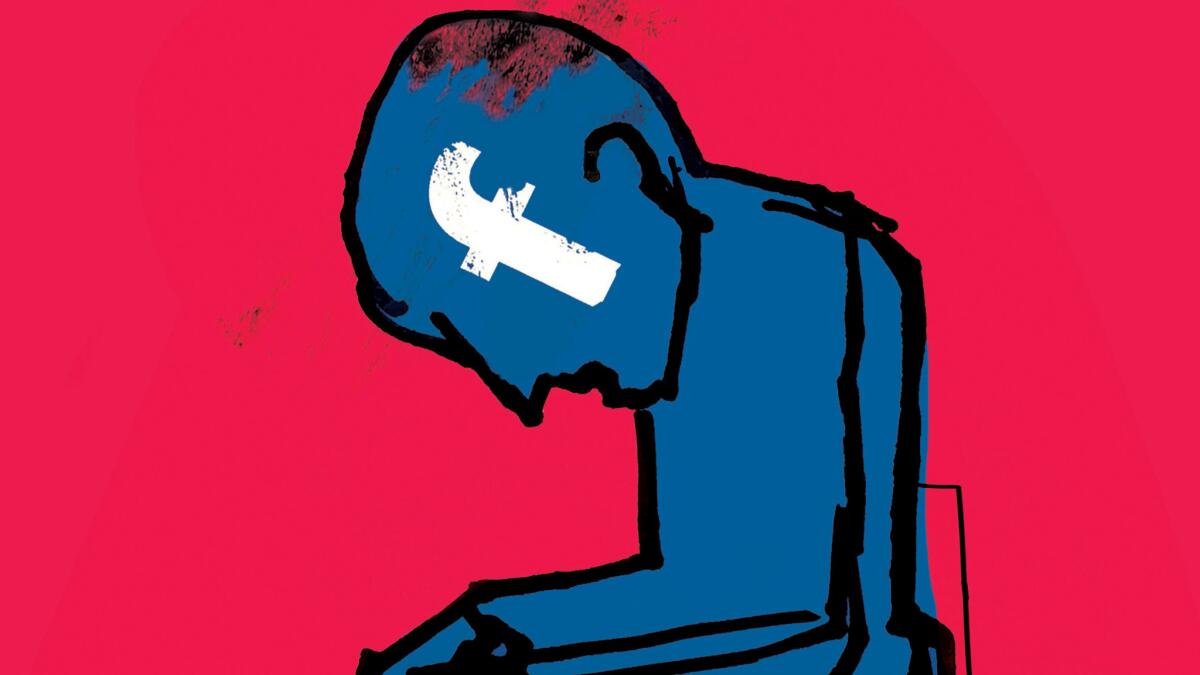When using social media becomes socially destructive

Putting too much stock into the lives of others as presented in social media can be damaging to your psyche.
- Share via
If you’re like most of the world, you make time for following friends on social media. In fact, 71% of adults who go online use Facebook and 23% use Twitter, according to the Pew Research Center. That isn’t a bad thing at all. Positive posting and communication can be a real boost to your confidence and sense of connection to others.
It can be surprisingly easy, though, to unconsciously slip into less healthful behavior on social media, and that can lead to anxiety and depression.
Want to beat that “Facebook funk”? New research has identified which habits can lead to trouble and how to change your social media perspective to improve your mood and outlook.
Don’t believe all their hype
A study by the University of Houston found that buying into the details of other people’s postings on Facebook can lead to symptoms of depression. If you’re looking at your college roommate’s wildly romantic honeymoon photos, for instance, it’s natural to feel inadequate if you’re still single. Researchers found that this is a very common form of distorted thinking, because study subjects who felt this way didn’t take into account that they were looking at a “highlight reel.”
“This can be an unhealthy perception because, of course, people present themselves in the best possible light with whatever message they are sending out on Facebook,” says study coauthor Mai-Ly Nguyen Steers, a teaching fellow at the university.
The more time you spend on Facebook, the more these false perceptions can become cemented. (Those who participated in the study spent about 30 to 60 minutes a day on Facebook.) To get a more realistic view of a friend’s experiences, Steers stresses it is important to spend time together in real life, not just virtually.
“Facebook feels like we’re connecting, but it’s not going to truly connect us the way sitting with friends and laughing and enjoying ourselves will.”
Feeling envious? Stop lurking
Do you feel a stab of jealousy every time you read on social media about your cousin’s gorgeous new home or your boss’ exciting European vacation?
“Surveillance” of those you know in order to get an inside glimpse of their material success is a potentially destructive behavior, according to researchers at the University of Missouri in Columbia. Measuring monetary or lifestyle achievements of someone you know can lead to negative feelings that person will not be aware you have and can easily lead you to create tension in a relationship where there was none. The more often you visit a particular person’s Facebook page, the more envious, and eventually depressed, you may end up feeling too.
“Most people who suffer from Facebook envy and depression tend to lurk quite a lot, and that repetition reinforces those bad feelings and impressions,” says study co-author Margaret E. Duffy, chair of the strategic communications faculty at the Missouri School of Journalism.
“If you’re constantly checking up on people and not feeling great about it, ask yourself, ‘What am I accomplishing by doing this?’” Duffy says.
Also, figure out what factors in your life are causing stress and making you sad, and therefore susceptible to envy. “If you find yourself mindlessly lurking, ask yourself how you’re feeling. Is it positive or negative? If it’s negative, make a goal to use Facebook only in a way that makes you feel good,” Duffy advises.
Don’t tweet your every thought
A second study by the University of Missouri found that people who send Twitter messages often — about anything and everything they’re doing — experience more strife in their marriages and romantic relationships than those who don’t tweet about their lives in detail.
This is most likely because over-sharing your life with others on Twitter, direct-messaging and posting images can create relationship conflict. Not only are you potentially developing bonds with new people, but also that bonding may deepen and lead to infidelity and subsequently divorce, according to the study’s author, doctoral student Russell Clayton. Twitter-related conflict doesn’t just affect bored, long-married couples, either. Clayton found that couples who had been together for both short and long durations could be negatively affected.
Another study by researchers at Boston University and Pontifical Catholic University of Chile in Santiago found that heavy social media users are 32% more likely to think about leaving their spouses.
Could this be because these heavy users have found more interesting potential partners/relationships online, or might it be because heavy social media use shuts a spouse out and creates marital strife in itself? “Probably it’s both,” says study co-author Sebastián Valenzuela, an assistant professor in the School of Communications at Pontifical. “For some people, social media may create new opportunities for ending an unsatisfying relationship and finding a new one. For others, it may well be that heavy social media use translates into an addictive behavior and, with it, all the negative consequences an addiction has on married couples.”
Limiting your time on Twitter could stop these relationship issues from worsening — or, better yet, from happening in the first place.





